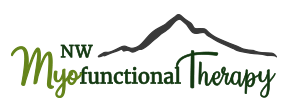Myofunctional Therapy and Jaw Pain
Jaw pain, also known as temporomandibular joint dysfunction (TMD), can be related to many different factors including, but not limited to: mouth breathing, clenching, grinding, dental crowding, chewing on one side of the mouth, nail biting, or even postural habits like resting your hand on your chin. TMD can also contribute to headaches and neck/shoulder tension and pain. The tongue contributes to stabilizing the jaw. If it isn’t functioning the way it’s meant to or is not in the correct spot, the jaw joint will struggle to be stable.
Patients often find that myofunctional therapy exercises are a great non-invasive option to help with jaw pain. They find relief from jaw pain and headaches if the underlying issues are tongue- and muscle-related. There are many different ways to alleviate symptoms and every person is different in terms of the jaw pain they encounter. Often, myofunctional therapists work along with other specialists like orthodontists, dentists, or physical therapists to help rebalance and retrain the muscles of the face, mouth, and neck to help restore to proper function.

How Does Myofunctional Therapy Help with Facial Trauma, Paralysis, or Special Needs?
People who have suffered from facial trauma, paralysis, and those with special needs such as Down syndrome, cerebral palsy, or chronic pain should be seen by a team of specialists. An advanced myofunctional therapist can be part of that team. The myofunctional therapist could improve swallowing, breathing, speech, and chewing. They help you balance the muscles of the face which could help relieve pain, decrease swelling, and improve chewing, speech, and the appearance of scars.
What are the symptoms of TMD?
- Jaw and facial pain, tension, and stiffness
- Pain and tension that radiates into the neck, shoulders, and upper body
- Earache
- Hearing difficulties
- Tinnitus (ringing in the ears)
- Headaches
- Toothaches
- Clicking or grating sounds when opening the mouth, yawning or chewing
- Clenching and grinding of teeth
- Difficulty opening the mouth wide or yawning
- Difficulty chewing
- Locking open of the jaw
- Dizziness
- Genetics
- Epigenetic changes
- Trauma
- Age-related degeneration
- Autoimmune conditions such as arthritis and rheumatoid arthritis
- Nutritional and dietary issues
- Chronic stress
- Postural and structural issues
- Tongue-tie
- Teeth clenching and grinding
- Improper chewing or swallowing patterns
- Incorrect tongue resting posture and mouth breathing
- Malocclusion
- Persistently sleeping on one side
